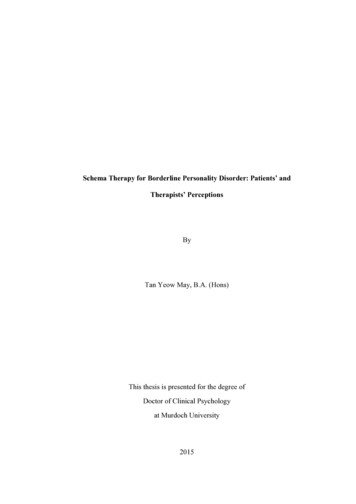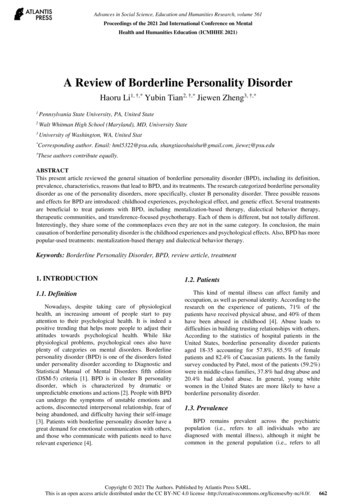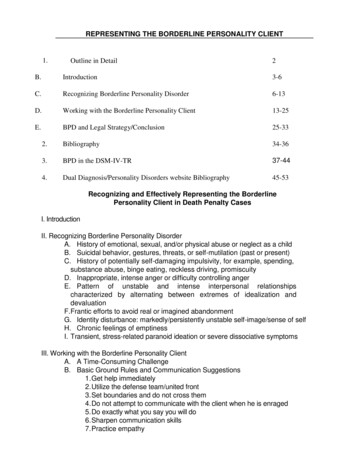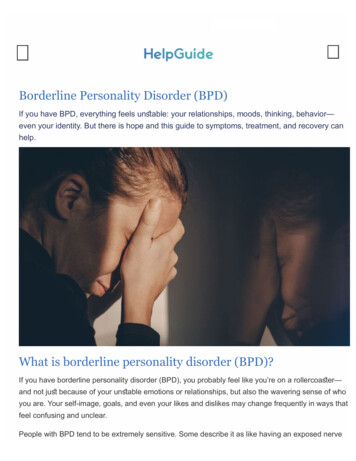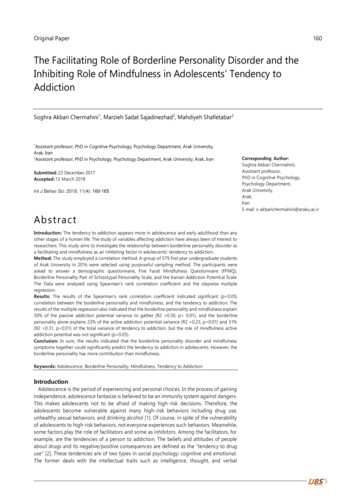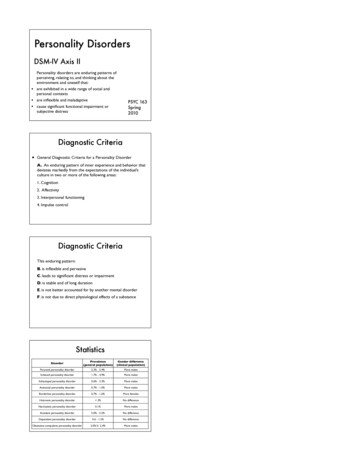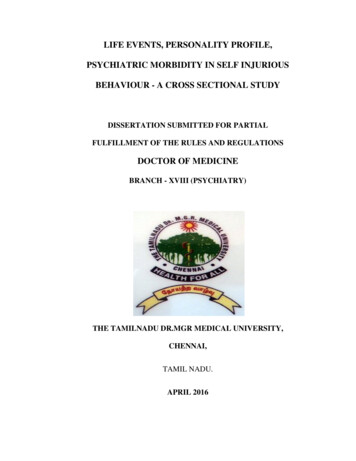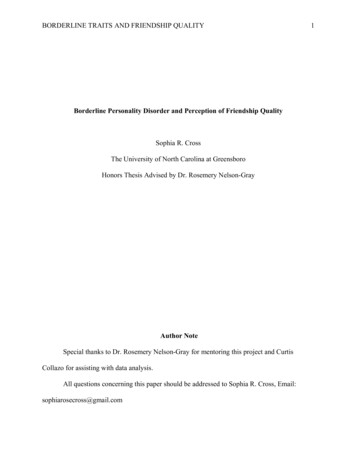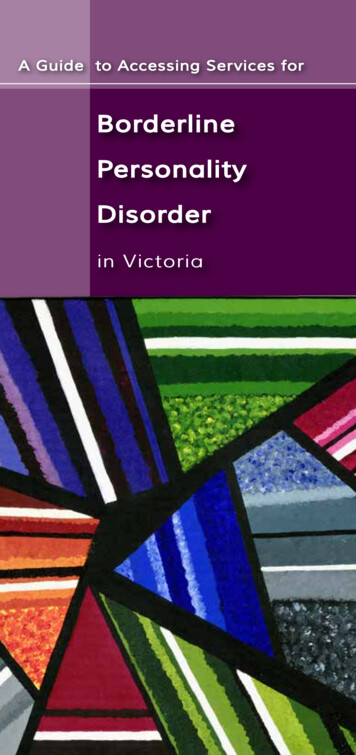
Transcription
A Guide to Accessing Ser vices forBorderlinePersonalityDisorderin Victoria
ABOUT THIS GUIDE:This Guide is not a comprehensive list of allBPD services in Victoria. The information inthis guide does not replace individually tailoredassessment and treatment planning by amental health professional.The Guide makes reference to the NationalHealth and Medical Research Council’s ClinicalPractice Guideline for the Management ofBorderline Personality Disorder (2012). Thefull Guideline is available online (see Resourcessection of this Guide, p20)Please let us know of any additions or changesto services for BPD by contacting the AustralianBPD Foundation atadmin@bpdfoundation.org.auThe Guide was produced by the Australian BPDFoundation in collaboration with Spectrum,the Personality Disorder Service for Victoria.Peter Fairbanks (Spectrum) and Katerina Volny(Australian BPD Foundation) collaborated withclinicians, carers and consumers from theseorganisations to write this guide.2nd Edition June 20162WHAT IS Borderline PersonalityDisorder (BPD)?According to the National Health andMedical Research Council’s ClinicalPractice Guidelines, Borderline PersonalityDisorder (BPD) is a mental illness that canmake it difficult for people to feel safe intheir relationships with other people, tohave healthy thoughts and beliefs aboutthemselves, and to control their emotionsand impulses. People with BPD mayexperience distress in their work, family,and social life, and may harm themselves.Research has not yet discovered exactlyhow a person develops BPD, but it probablyinvolves a combination of biological factors(such as genetics) and experiences thathappen to a person while growing up (suchas trauma or neglect early in life). For mostpeople with BPD, symptoms begin duringadolescence or as a young adult, and tendto improve during adult life.You can read more about this in theNational Health and Medical ResearchCouncil’s Clinical Practice Guidelinesfor the Management of BorderlinePersonality Disorder. The summaryprovided on pages 1 to 4 of the Guidelineprovides information about BPD in plainlanguage.3
WHY WE HAVE DEVELOPEDTHIS GUIDEBPD is an illness that has a goodprognosis with appropriate treatment,however it can be challenging to accesstreatment. There can be considerablestigma and misinformation about thisillness. The Australian BPD Foundationand Spectrum have jointly developed thisguide to promote hope and optimism forpeople experiencing BPD, their family,carers and treating clinicians. We work tocombat the stigma and discrimination thatpeople experiencing this disorder oftenface.Although we still need to further developaccess to appropriate service supports forthose experiencing Borderline PersonalityDisorder, there are already severalspecialist treatment services alreadyestablished in Victoria, including SpectrumPersonality Disorder Service Victoria(which provides state-wide services foradults) and Orygen Youth Health (whichprovides services for young people intheir catchment area). Many other publicmental health services have developedtheir own specific Borderline PersonalityDisorder treatment programs.ASSESSMENT & DIAGNOSISOF BPDIn assessing for a possible diagnosis ofBPD, a trained mental health professionalshould carefully ask questions about theperson’s life, experiences and symptoms.It is also important for people withsymptoms of BPD to be referred for afull medical checkup to eliminate thepossibility of a physical illness impactingupon their mental health. This may affectthe relevance of a diagnosis of BPD andthe treatment approach selected.The initial assessment should includean assessment of the person’s safetywith regard to self and others, andshould also assess for any co-occurringproblems, symptoms and diagnoses.Information about past trauma shouldbe obtained sensitively in order to avoidre-traumatising the person. Because thesymptoms of BPD can overlap with otherconditions it can be challenging for lessexperienced health professionals to makethe diagnosis accurately. If the personis already accessing several services,the assessment should also include anevaluation of how this is functioningfor the person and how this could bestrengthened.It may be necessary to get a secondopinion from a mental health professional45
who has experience in the diagnosis andtreatment of persons with personalitydisorder.People wanting an assessment and/ ortreatment can discuss referral optionswith their GP. A decision about referralto public or private services is usuallybased on the assessment and takes intoaccount such factors such as the severityof the illness and the complexities of thesymptoms and circumstances.Assessment and diagnosis can beobtained via:1. Private Sector Services A generalpractitioner (GP) can assist with facilitatinga referral to a private allied health clinicianor psychiatrist with experience in theassessment and treatment of psychiatricdisorders, including personality disorder,and other specialist mental healthservices (such as private group treatmentprograms). Services such as the AustralianPsychological Society referral service canalso provide information with regardto experienced practitioners. GeneralPractitioners can also facilitate a referralfor the one-off psychiatric assessment andtreatment recommendations that come6under Medicare (Item 291).2. Public Sector Services: A GP canfacilitate a referral to Spectrum’s BPDClinic for a one off psychiatric assessmentand treatment recommendations underMedicare (Item 291). This is free of chargefor the person being assessed. MedicareItem 293 allows for one follow up reviewwithin a year of the initial assessment.Spectrum has more information atwww.spectrumbpd.com.au.3. Public Mental Health Services (accessedvia a local public hospital network)provide multi-disciplinary mental healthassessments for people with high mentalhealth needs. They also provide treatmentfor people with borderline personalitydisorder. Public Services prioritise peoplewith severe and/or complex conditions.There may be waiting lists for theseservices.7
TREATMENT FOR BPDBorderline Personality Disorder is atreatable illness. In the last two decadesscientific research has made significantprogress towards a better understandingof the symptoms and experiences of thosewith this diagnosis and what works andtends not to work in various treatmentsettings.There are now several evidence-basedpsychological therapies that are effectivein the treatment of people with BorderlinePersonality Disorder.Clinicians who have received training andare providing treatment for people witha BPD diagnosis may utilise a range ofdifferent approaches to treatment. Thesetreatments share common features thathave been found to be effective in assistingpeople recover from BPD.Psychiatric inpatient hospital stays shouldgenerally be brief and be directed at theachievement of specific goals that areagreed upon by the clinician and thepatient at the time of admission.Admission to psychiatric inpatient facilitiesmay be deemed necessary when a person’ssituation is experienced as overwhelmingand there is significant risk to themselvesor others.Public inpatient care is generally reservedfor short-term crisis intervention for peoplewith co-occurring mental illness or thoseat high risk of suicide or medically seriousself-harm.Medication is not a person’s maintreatment for BPD, because evidence hasshown that medicines usually only provideminimum relief of symptoms for peoplewith BPD and do not improve other aspectsof the illness.89
PSYCHOLOGICAL TREATMENTS FOR BPDDialectical Behaviour Therapy (DBT)is a therapy developed by MarshaLinehan. It includes a combination ofskills training sessions and individualsessions. The skills training supportsdevelopment of mindfulness,emotional regulation, self-soothing andinterpersonal effectiveness.DBT is available at Spectrum, variousArea Mental Health Services, andsome private hospitals in Victoria.Acceptance and Commitment Therapy(ACT) aims to support a person toaccept what is out of their personalcontrol and commit to action thatimproves and enriches life. This isachieved through using psychologicalskills to effectively deal with painfulthoughts and feelings, so that they havemuch less impact and influence.ACT is available at Spectrum & SouthWest Healthcare.Mentalization Based Therapy (MBT)is a therapy that aims to increase aperson's capacity to reflect on theirpersonal internal experiences throughfeelings, thoughts, urges, memories,beliefs and wishes as well as learninghow to better understand otherpeople's internal experiences. This10increases self-understanding andrelationships with others reducesmany of the challenging behavioursassociated with a diagnosis of BPD.MBT is available at Spectrum &Goulburn Valley Area Mental HealthService at Shepparton & AlfredPsychiatric Child Area Mental HealthServiceCognitive Analytic Therapy (CAT)is a time limited therapy. The CATpractitioner works to identify chainsof events, thoughts, emotions andmotivations which help explain howproblems such as self harm, angryoutbursts etc develop. It also aims toidentify patterns of relating that causeproblems between the person with BPDand others. Often these patterns aredeveloped early in childhood and arerepeated later in life.CAT is available at Orygen YouthHealth.Schema-Focused Therapy (SFT)Schemas are ridged core beliefs aboutoneself. The basis of BPD maybe seenas a pattern of maladaptive schemasthat develop in early life. SFT addressesthese maladaptive schemas and theassociated emotional, cognitive and11
FACTORS FOR EFFECTIVE TREATMENTbehavioural difficulties.SFT is available at Victoria Clinic &Epworth Hospital.General Psychiatric Management (GPM)and Good Clinical Care* are evidencebased treatment approaches based onPractice Guidelines for the Treatment ofBorderline Personality Disorder. Bothhave been found to be effective and havelong-term positive effects across a broadrange of outcomes. As these are basedon guidelines they can be straightforwardto learn and apply in a variety of mentalhealth settings. These therapies areguided by similar factors.A clear plan for therapy guided by anunderstanding of what works for BPD.Clear limits of what the therapist can andcan’t provide and when to refer to othersupports as needed.Providing the person and their supportnetwork eg. family/friends/carerswith information about the diagnosis,treatment and prognosis in a hopefuland realistic way.Empathy and validation of the person’sdistress.* “General Psychiatric Management” and “Good ClinicalCare” should not be confused with TAU (Treatment asUsual).Studies show that therapy given bya person trained in treating BPDand guided by the National PracticeGuidelines can be just as effective as oneof the therapies mentioned providing itincludes the following factors:A focus on the relationship. Thetherapist treats the person as anindividual and seeks to understand whatis going on for the personThe therapy focuses more on the reasonsfor the person’s behavior/s and actionsthan on the actions themselves and helpsthem to develop an understanding oftheir mind (thinking / feeling) and the linkbetween thoughts and actions.An exploration together of whatsituations lead to distress.1213
Assisting in the learning of less harmful skillsfor managing stress. Being prepared andhaving a consistent response to distress.The repair of misunderstandings betweenthe therapist and the patient when theyoccurDeveloping together a collaborativemanagement plan .what works and when /what doesn’t work and whyPromotes autonomy and reducedependence.Recognising that the person’s experience is“real” to them. They are “doing the best theycan” given their circumstances at that time.Building and maintaining motivation.Some people with BPD feel uncertainabout change. Many find it hard toimagine how things can improve so thetherapist must maintain hope for changeeven when the person with BPD is unableto.The therapy also focuses on helping theperson regain or maintain their interestsand vocation/study and relationships.14Treatment can change:»» the ability to manage emotions andimpulses and to change the way peoplerelate to themselves and others,especially in close relationships»» the gradual development of a stablesense of self»» assisting people to regain or maintaintheir interests. This will vary fromperson to person and may take manyforms eg study, part-time job, yoga,sportsThe patient’s readiness for long termtherapy needs to be carefully consideredby both the patient and the therapistprior to both making a commitment to afull course of psychological treatment.For a person to achieve the best resultsfrom psychological therapy he or shewill need to be willing and able to attendappointments regularly (often weekly)and to be able to openly explore theirexpectations of the therapy and theirtherapist.Assessment and some pre-therapysessions can help patients who areapprehensive or anxious aboutcommitting to therapy to familiarisethemselves with what is involved.There is no evidence at this time thatany of the treatments mentioned isbetter than any of the others.15
Factors that may affect the treatmentprocess»» Prolonged hospital admissions and/or frequent hospital admissions as aprimary method of risk management.»» Irresolvable breaches (disagreements)in the relationship with a therapist.»» Treatment arrangements lacking clearstructure and consistency.»» Excessive use of medication asa primary or secondary form oftreatment.»» Use of substances and/or untreatedco-morbid illness.National Health and Medical ResearchCouncil guidelines state that peoplewith a Borderline Personality Disorderdiagnosis should be provided withstructured psychological therapiesthat are specifically designed forthem and conducted by one or moreadequately trained and supervised healthprofessionals. The majority oftreatmentsfor BPD should be provided withincommunity based services.Role of medication»» There is no specific medication for BPD.Medication may be a useful additionto therapy. It should not be the onlytreatment.»» Lack of a treatment and/or crisisplan, developed and negotiatedby the patient and the therapistand involving input from otherpractitioners and family members(where appropriate and approved).»» For some people medication can helpreduce symptoms of depression,anxiety, impulsivity, anger and moodswings allowing them to get the mostout of therapy and life»» A rigid and inflexible therapist.»» Side effects of medications eg weightgain, excessive sleepiness, may havea negative impact upon the person’sability to function»» When clients feel they have noownership of their treatment.»» May help ease a crisis»» As well as its direct effect, medicationoften has a powerful symbolic function1617
HOW TO ACCESS TREATMENT(placebo effect). This can includefeelings of being cared about, notbeing cared about, empowered,disempowered, having somethingunwanted forced upon them.»» At times prescribing doctors may feelat a loss about how they can help apatient who is feeling so hopelessand begging for something, anything,to ease their distress. Prescribingmedication is something doctors cando, and in the moment of a changeof medication, an increase or a newmedication their patient might feelheard.»» Stopping medication may beperceived as abandonment»» Unfortunately, long term, medicationdoes not help the person to developa stable sense of who they are andto learn new skills to manage theiroverwhelming emotions. Medicationmay dampen feelings, However, inthe longer term the person needs tolearn skills to help them tolerate theirintense feelings rather than pushthese feelings away.18For a person to properly make use ofpsychological treatment he or she willneed to be able to attend appointmentsregularly and to be able to openlyexplore their expectations of thetreatment and the therapist.Prior to making a commitment to afull course of treatment, some intialpreparatory work can assist patientswho are apprehensive or highly anxiousabout engaging to prepare and betterfamiliarize themselves with what atreatment entails.Treatment Pathways:1. Public community mental healthservices, can be accessed via local publichospital networks. Specialist treatmentfrom Spectrum can be accessedvia public mental health services orsometimes via a GP (for those living inVictoria).2. Private community mental healthservices can be accessed via privatehospitals and private community basedBPD treatment programs.19
3. Private health insurance withpsychiatry inpatient cover and referralfrom a private psychiatrist attachedto the hospital will facilitate accessto private BPD treatment programssuch as Dialectical Behaviour Therapy.Once engaged in therapy, if the patientconsults the psychiatrist on the sameday that they attend the therapysessions then the psychiatrist’s fee iscovered by some insurance schemes.Please check with your insuranceprovider when considering serviceoptions.Spectrum for a list of possiblepsychologists that work with BPD.Some limited rebate available forpsychologists or other experiencedallied health professionals. Thediagnosis of BPD is not a recognizedcondition for rebate so theindividual will need to have a cooccurring condition such as anxiety,depression etc. Psychologicaltreatments may be required for up toa period of two years.4. A GP can refer you to a privatepsychiatrist for treatment. Individualscan look at the RANZCP website (‘find apsychiatrist’) or call Spectrum for a listof possible psychiatrists that work withBPD.Medicare funds cover part of the costsof consulting a psychiatrist for up to 50sessions a year.5. The GP can also refer you to aprivate psychologist for treatment.Individuals can contact the AustralianPsychological Society (APS) or2021
SUPPORT FOR FAMILIES & FRIENDSResource ListPublic Area Mental Health Services (AMHS)Families, friends and other peoplesupporting someone with BPD often playan important role in the recovery of aperson with BPD.Some public Mental Health Services areproviding specialist BPD treatments locally.You can enquire about what local treatmentsare esFamilies and friends can also accesssupport for themselves from communityagencies to receive information about thediagnosis, the prognosis and how to bestsupport the person with BPD, includinghow to appropriately response to suicideand self harm behaviours and how tomanage their own feelings of anxiety, griefand feeling blamed by others.COMPLAINTS PROCESSES:Complaints and feedback can lead toimproved services and experiencesfor everyone. If you have concerns,complaints or grievances about accessto services you may wish to speak withthe managers/complaints officers of theclinical services involved or contact theMental Health Complaints Commission.The Mental Health ComplaintsCommission can be contacted on:www.mhcc.vic.gov.auhelp@mhcc.vic.gov.au221800 246 054For young peopleHYPE Clinic: for youth (15 to 24yo) in theOrygen Youth Health le-earlyHeadspace: a youth service (12 to 25yo) mayprovide assessment and/or treatmenthttp://headspace.org.au/Private Hospital Therapy programsMost private psychiatry hospitals runday programs for various mental healthconditions, including BPD. This facility isrelatively easy to access for those patientswho have private health insurances withinpatient psychiatry covers. Private hospitalsgenerally require patients to be assessed andreferred to the day programs by psychiatristsaccredited to practice at those clinics.Albert Road Clinic 1300 251 243www.albertroadclinic.com.au/23
Resource ListDelmont Hospital (03) 9805 7370www.delmonthospital.com.au/Epworth Hospital (03) 9426 6666www.epworth.org.au/Geelong Clinic (03) 5240 0700www.thegeelongclinic.com.au/Melbourne Clinic (03) 9429 4688www.themelbourneclinic.com.au/Independent Private Programs:Melbourne DBT Centre (03) 9530 9777(provides after hours A number of other private psychology clinics provide DBT and other treatments forBorderline Personality.Private Psychologists can be found by usingthe Australian Psychological Society website: www.psychology.org.au/FindaPsychologist/ or the Australian Clinical PsychologyAssocia-tion website t/Mitcham Private Hospital (03) 9210 3155:www.mitchamprivate.com.auPsychiatrists can be found by using theRANZCP website: rist.aspxNorthpark Private Hospital (03) 9468 0100www.northparkprivatehospital.com.au/For Carers and FamilyMind Australia run a monthly supportgroup for family and friends of a personwith BPD, a carer helpline 1300 550 265and individual counselling sessions for carers: www.mindaustralia.org.auBouverie Centre run a Fostering RealisticHope Group: (03) tering-realistic-hopeFamily therapy is also offered: www.bouverie.org.au/help-for-familiesSt John of God Pinelodge Clinic(03) 8793 act us.aspxVictoria Clinic (03) 9526 0200www.tvccentre.com.au/Wyndham Clinic (03) 9731 6646wyndhamclinic.com.au/24Resource List25
Family Connections: a free, 12-week coursethat meets weekly for two hours to provideeducation, skills training, and supportfor people who are in a relationship withsomeone who has I (Children of Parents with a MentalIllness). Many useful resources for children,parents and professionalshttp://www.copmi.net.au/For Drug and Alcohol services:Turning point 8413 8413www.turningpoint.org.au/Treatment.aspxDirect Line state-wide drug and alcoholservices 1800 888 236www.directline.org.auSHARC (Self Help Addiction ResourceCentre) promotes self-help approachesto recovery from severe alcohol anddrug related issues.www.sharc.org.auWeb ResourcesSpectrum Statewide BorderlinePersonality Disorder Servicewww.spectrumbpd.com.au/Australian BPD FoundationIncludes links to two forums run by SANEAustralia: one for lived experience and theother for carers (NOT BPD specific). Theseforums provide a safe online peer support.www.bpdfoundation.org.au26Helping Young People Early(HYPE) Orygen Youth -earlyProject Air Strategy for ctairstrategy/index.htmlNational Education AllianceBorderline Personality Disorder(NEA inepersonalitydisorder.com/SANE Helpline 1800 187 263www.sane.orgThe Linehan Institute Behaviour Techhttp://behavioraltech.org/index.cfmNational Health and Medical ResearchCouncil Clinical Practice Guidelines for theManagement of Borderline PersonalityDisorderwww.nhmrc.gov.au/ files nhmrc/publications/attachments/mh25BPD Community Victoriawww.bpdcommunity.com.au27
What to do in an emergencyIn case of emergency contact 000, yourlocal hospital emergency department,or your local mental health services 24hour psychiatric triage phone line.Lifeline13 11 14www.lifeline.org.auSuicide Call Back Service1300 659 467www.suicidecallbackservice.org.auVictorian Suicide Help Line1300 651 25128
Borderline Personality Disorder (2012). The full Guideline is available online . disorders, including personality disorder, and other specialist mental health services (such as private group treatment . Schema-Focused Therapy (SFT) Schemas are ridged core beliefs about oneself. The basis of BPD maybe seen
